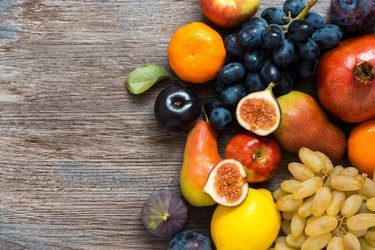
If you find your stomach making bizarre sounds and feel the need to sprint to the bathroom, it's possible that you ate something that didn't agree with you. Diarrhea can be defined as loose or watery stools three or more times per day. This happens when food and liquids pass through your body too quickly. Although fruits should be a staple in your diet because of their vast array of health benefits, some fruits can cause diarrhea if you eat too much of it. Everyone reacts to fruit differently; the fruit that gives your spouse diarrhea might not lead to any side effects for you.
High-Fiber Fruits
Video of the Day
The College of Agriculture & Life Sciences at the University of Arizona reports that a high-fiber diet can lead to diarrhea. Many fruits have a-high fiber content that can potentially cause you to have diarrhea. One cup of raspberries, for example, has more than 8 grams of fiber, which is about 32 percent of your recommended daily intake of fiber, depending on your gender. If you consume a lot of raspberries or eat them dried in a concentrated form, you might react with a bout of diarrhea. In addition to raspberries, fruits that are notably high in fiber include apples, mangos, apricots, figs, oranges, pears, plums and strawberries, says Everyday Health.
Video of the Day
Read More: Is the Sugar in Fruit Bad for You?
Lycopene in Fruit
Lycopene is the carotenoid that gives many fruits their red pigment. It is present in many berries and fruits, including guava, watermelon, papaya, grapefruit and mango according to MyFoodData. Consuming more than 30 mg of lycopene daily has the potential of causing indigestion, bloating and diarrhea, warns the American Cancer Society. A common food that is suspect for causing diarrhea from lycopene is a popular picnic food — the nutrition in watermelon makes it a healthy snack to give to children. However if eaten in excess, the result might be a stomach ache from watermelon and gastro issues.
Diarrhea From Bacteria in Fruit
The Food and Poison Journal warns that symptoms of abdominal cramps and diarrhea from cantaloupe, honeydew and watermelon caused by the Salmonella bacteria is a problem in America. An investigation by the Centers for Disease Control and Prevention found that pre-cut melons, including fruit salads, are a likely source for the 60 cases in 2018 of Salmonella bacteria outbreaks. Salmonella causes diarrhea and abdominal cramps in most people within 12 to 72 hours after consumption. Within a week, most people recover without treatment.
Read More: Health Benefits of Dried Fruit
Tips To Prevent Diarrhea From Fruit
If you find that fruit gives you diarrhea, UWHealth.org suggest some tips to lower the fiber in the fruits you eat:
Eat fewer fruits in smaller portions
Limit high fiber fruits such as unpeeled apple, avocado,
blueberries, dates, blackberries, pears, oranges, prunes and raspberries.
Choose fruits that contain less than 1.5 g of fiber per half-cup serving
Steps to Take
You don't necessarily have to visit your doctor upon realizing that you have diarrhea, stomach cramps and bloating from eating too much fruit. But you should drink water to lessen the risk of becoming dehydrated. If you notice that the diarrhea worsens after certain foods, including fruits, eliminate them from your diet until the symptoms of the diarrhea disappear. You can help alleviate your diarrhea by eating low-fiber "BRAT" foods that will help firm up your stool. These include white rice, bananas, applesauce and toast suggests HealthLine. Call your doctor if the diarrhea doesn't improve within five days.
- MedlinePlus: Diarrhea
- University of Arizona Cooperative Extension College of Agriculture & Life Sciences: Dietary Fiber
- Harvard University Health Services: Fiber Content of Foods in Common Portions
- Pancreatic Cancer Action Network: Diarrhea
- MedlinePlus: Soluble vs. Insoluble Fiber
- USDA Dietary Reference Intakes
- Everyday Health: Is Your Diet Giving You Diarrhea?
- HealthLine: The 5 Most Effective Diarrhea Remedies
- American Cancer Society: Complementary and Alternative Medicine
- UWHeakth.org: Health Facts for You
- Food and Poison Journal: What is it with Cantaloupe? And, Salmonella and Listeria, etc.
- MyFoodData: Top 10 Foods Highest in Lycopene
- National Digestive Diseases Information Clearinghouse: Diarrhea